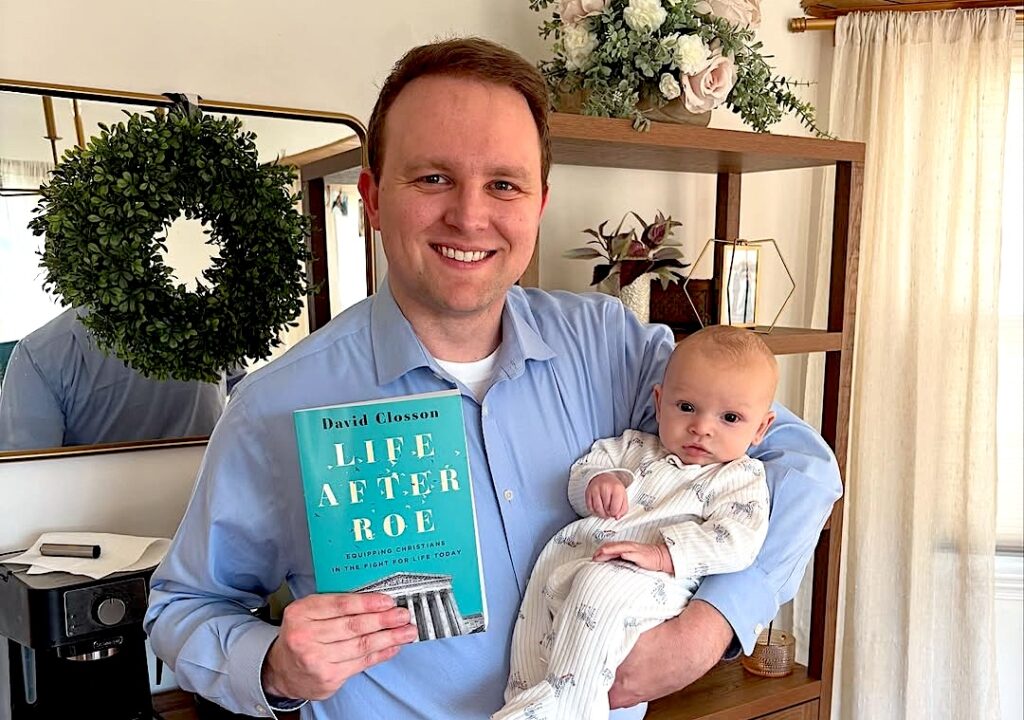(The Lion) — The Supreme Court overturned Roe v. Wade nearly three years ago, but the pro-life movement is far from over.
That’s the message of a newly released book, Life After Roe: Equipping Christians in the Fight for Life Today. Authored by the Family Research Council’s David Closson, who directs the council’s Center for Biblical Worldview, the book provides a guide for Christians who are navigating the next chapter of the pro-life movement in the post-Roe era.
“I want to educate, I want to equip, and I want to encourage,” Closson told The Lion in an interview. “The goal for our movement was never to overturn Roe – that’s just one step towards making abortion ultimately unthinkable and illegal.”
The book aims to address the “biblical illiteracy” even among Christians on pro-life issues, as well as equip pastors, lawmakers and laypeople about the next front of the abortion battle, including chemical abortions and statewide ballot measures. Closson also seeks to encourage the movement by telling “firsthand accounts” from states where pro-life legislation was successful.
Closson said he hopes his readers will “walk away from this book convinced that abortion really is the pressing moral issue of our time and that they will be equipped from God’s revealed Word as well as church history, that as Christians, we are profoundly pro-life people.”
The book begins with several polls, including a June 2023 survey commissioned by the Family Research Council, finding a wide variance in beliefs among Christian church attendees on abortion. About 16% of churchgoers admitted to having “paid for, encouraged, or chosen to have an abortion.” The survey found that 63% of churchgoers said they identify as pro-life.
“I think the broader culture looks at the church as monolithic, that we’re all in lock step,” Closson said. “Sixty-three percent is a majority, but that leaves 37% that do not even consider themselves pro-life. That was surprising to me.”
Another surprising statistic, he said, was only 44% of regular church attendees said they had heard a sermon or teaching on abortion since Roe v. Wade was overturned. In an age where abortion has been increasingly seen as political, a lot of pastors could have “fear of offending members of their congregation,” he said of the lack of church sermons on the issue.
“One thing that was encouraging, though, is that 71% of the churchgoers told us they desired worldview training on abortion and the value of human life,” he noted.
In Life After Roe, Closson compares the Republican and Democratic party platforms on abortion going back to 1976 and finds that “as recently as 2004, the Democrats’ national platform basically said we should respect pro-lifers.”
“Things really got supercharged though in 2016 when nominee Hillary Clinton for the first time – first major party candidate to ever say this – said that we should revoke the Hyde Amendment, the legislative provision that prohibits tax dollars from funding abortion,” Closson said, noting that prominent Democrats have followed suit since.
“I do think we’ve seen a remarkable shift in a pro-abortion direction for the Democrats, that’s almost breathtaking to see how enthralled to the abortion lobby they are,” he said, suggesting it adds to abortion being perceived by some Christians as a solely political issue.
However, pro-lifers need not only focus on life before birth, but after. As a new father to a four-month-old, Closson said he has seen firsthand how expensive diapers, strollers, and car seats really are.

“And so I think we do, in our movement, recognize when a woman or teenage girl makes the courageous decision to have her baby, that we do need to support her,” he said. As women have babies, “let’s make sure we’re coming alongside and supporting them.”
As readers take on the next chapter of the fight for life, Closson says it’s important to recognize that Roe v. Wade, despite being overturned, was in place for 49 years with far-reaching and continued consequences. The pro-life movement will not be able to “rewire” the pro-abortion culture in a few months or even years.
“For decades, abortion has been seen as morally praiseworthy, morally permissible, because our law has said it is so. And so we need to realize we need to be in it for the long haul, to testify to the goodness of babies and intact families, and I think it begins in our churches, pastors preaching about the issue,” Closson said.
Christians need to “take stock” of the statistics that show the church is not as consistently pro-life as many may believe, he said. “As we do that in our families and our churches, we can testify [about] that to the broader culture.”

